
Ausstellung
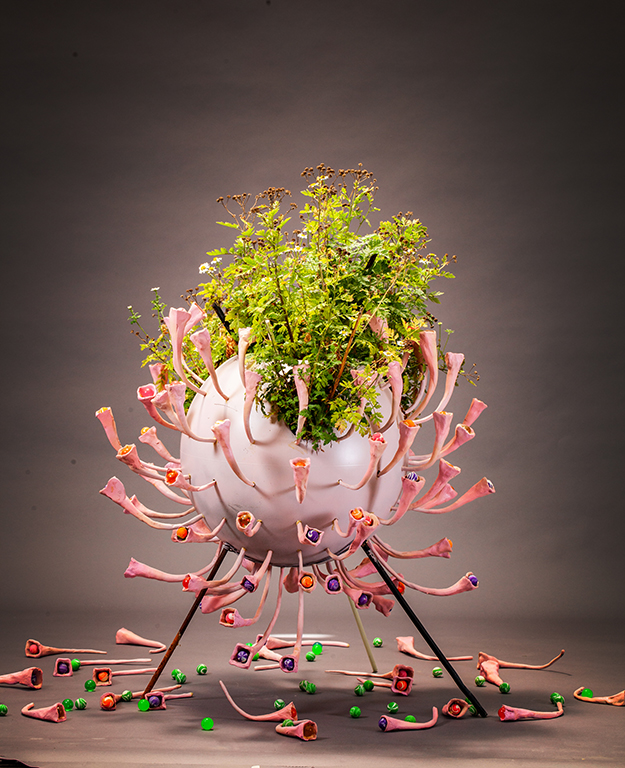
Mothers*, Warriors, and Poets: Fürsorge als Widerstand
Mit Werken von Anna Gohmert, Renate Liebel, Marie Lienhard, Anna Schiefer und Julia Wirsching.
Kuratiert von Sascia Bailer und Didem Yazıcı
Vom 21. Mai – 9. Juli 2023 im StadtPalais – Museum für Stuttgart
Frauen* – insbesondere Mütter* – leisten weiterhin den Großteil un(ter)bezahlter Sorgearbeit, sei es im privaten oder im öffentlichen Bereich. Im Kunstbetrieb werden diese Ungleichheiten im Zusammenhang mit Sorgeverantwortung noch verstärkt; der Gender Pay Gap im Kunstbereich liegt höher als im gesamt-gesellschaftlichen Durchschnitt und Diskriminierung aufgrund von Sorgearbeit ist weit verbreitet: „Sex, Tod, Politik: Die Kunst kann heute alles zeigen. Aber Kinder? Sie sind kein Thema. Vor allem für ihre Mütter gelten sie als Karrierekiller“, so die Kunstkritikerin Elke Buhr im Kunstmagazin Monopol.
Unser künstlerisch-aktivistisches Ausstellungs- und Veranstaltungsprogramm setzt sich gegen solche hartnäckigen, patriarchalischen Narrative zur Wehr, da sie festzuschreiben scheinen, wie Fürsorge in unserer Gesellschaft organisiert wird – und dadurch nur weiterhin Menschen ausschließt, die Fürsorge leisten. Indem wir also feministische Ethiken der Fürsorge in den Vordergrund stellen – durch künstlerische Arbeiten und diskursive Formate – wollen wir diese diskriminierenden Erzählungen in Frage stellen und gemeinsam Gegenentwürfe ausloten:
Die Ausstellung zeigt fünf Stuttgarter Künstlerinnen, die ebenfalls Mütter* sind, mit Arbeiten, die sich mit Fürsorge, reproduktiver Gerechtigkeit, gesellschaftlichen Rollenerwartungen, Naturheilkunde, Verletzlichkeit und Abhängigkeitsverhältnissen auseinandersetzen.
Die Ausstellung wird durch ein Veranstaltungsprogramm eröffnet, das Antworten auf die Frage sucht: Welche strukturellen Veränderungen im Kunstbereich sind notwendig, um den Lebenswirklichkeit von Künstler*innen mit Sorgeverantwortungen gerecht zu werden?
In Vorträgen, Performances und Workshops sind die Teilnehmenden eingeladen, über die Beziehung von Kunst und Fürsorge zu lernen und kollektiv Strategien und Forderungen auszuloten, wie den Bedürfnissen von Sorgearbeitenden in der Kunst Rechnung getragen werden kann.
„Mothers*, Warriors, and Poets: Fürsorge als Widerstand“ verfolgt das Ziel, kunstschaffende Eltern in der Region zu vernetzen – und alle, die für diese Themen Sorge tragen möchten. Kunstschaffende mit Sorgeverantwortung sollen in ihrer Arbeit und ihren Rahmenbedingungen bestärkt werden; bestehende Initiativen und Widerstandsenergien sollen zusammengebracht werden, um ein kollektives Manifest für einen gerechteren Kunstsektor in Stuttgart und Umland zu verfassen.
„Mothers*, Warriors, and Poets“ ist eine künstlerisch-aktivistische Plattform, die von den Stuttgarter Künstlerinnen Anna Gohmert, Renate Liebel und Marie Lienhard gegründet wurde, um die Beziehung zwischen künstlerischer Produktion und Mutterschaft* zu hinterfragen und neu zu verhandeln.
Der Name der Platform ist inspiriert von der Selbstbeschreibung der Schwarzen Feministin Audre Lorde, “black, lesbian, mother, warrior, poet.” Für Lorde war es von zentraler Bedeutung, sich mit mehreren Begriffen gleichzeitig zu beschreiben, da diese die Komplexität ihrer Identität als auch ihrer Kämpfe als Schwarzer Feministin, Künstlerin, und Mutter* aufzeigt – Eine Mutter*-Künstler*in zu sein bedeutet, gleichzeitig eine Krieger*in zu sein, und radikal und sinnbildlich wie eine Dichter*in zu denken. Für diese Ausgabe von „Mothers*, Warriors, and Poets“ luden die drei Initiatorinnen der Plattform die Künstlerinnen Anna Schiefer und Julia Wirsching ein, sowie Didem Yazıcı und Sascia Bailer als Kuratorinnen – alle lassen sich als freie Kulturschaffende mit Sorgeverantwortung in Baden-Württemberg verorten.
*Wir verwenden den Begriff Mutter mit einem *, um diesen für alle Menschen mit Sorgeverantwortung zu öffnen.
Kontext der Ausstellung
Das gesamte StadtPalais – Museum für Stuttgart verwandelt sich im Frühjahr 2023 für sechs Monate in das „FemPalais – Festival der Frauen*“.
Inhaltlich sind alle Ausstellungen, Veranstaltungen und Formate ausschließlich Stuttgarter Frauen* gewidmet und werden von Frauen* geleitet, geplant und umgesetzt. Mit einem multiperspektivischen und intersektionalen Ansatz macht das Festival Frauen* sichtbar, welche die Geschichte der Stadt Stuttgart und über den Kessel hinaus in der Vergangenheit geprägt haben und die Stadt Stuttgart in Gegenwart und Zukunft mitgestalten. Es entsteht ein Festival, das möglichst viele Mädchen* und Frauen* mit ihren Söhnen*, Brüdern* und Vätern* zu einem Besuch anregen und begeistern soll.
„FemPalais“ hat für eine der Ausstellungen “Mothers*, Warriors, and Poets” eingeladen, um wichtige feministische Aspekte und Beiträge in Stuttgart und darüber hinaus zu thematisieren. Mehr hier.
Eröffnungsprogramm am 21. Mai 2023
Kunst mit Kind
Für einen Kunstbetrieb, in der künstlerische Praxis und Sorgearbeit vereinbar sind
im Stadtpalais – Museum für Stuttgart
Konrad-Adenauer-Straße 2, 70173 Stuttgart
Programm
10.30 Uhr: Einlass
11.00 Uhr: Ausstellungseröffnung & Offenes Gespräch
Mit Sascia Bailer & Didem Yazıcı (Kuratorinnen)
Anna Gohmert, Renate Liebel, Marie Lienhard, Anna Schiefer, Julia Wirsching (Künstlerinnen)
Auf Deutsch und Englisch
Im Salon Sophie, StadtPalais
12.00 Uhr:
Vortrag “How to Not Exclude Mother Artists and other Parents” von Hettie Judah
Moderiert von Sascia Bailer und Didem Yazıcı.
Anschließende Gesprächsrunde mit Publikum.
Vortrag auf Englisch, im Raum vor Ort Flüster-Übersetzung ins Deutsche. Im Saal Marie sowie virtueller Livestream des Vortrags. Zur online Teilnahme bitte hier registrieren
13.30 Uhr Mittagspause
14.30 Uhr: Workshop “Building Caring Infrastructures” mit Sascia Bailer
Kollektives Manifesto-Schreiben für eine Kulturbranche, die Fürsorge und künstlerisches Arbeiten vereinbar macht
Auf Deutsch. Im Saal Marie, StadtPalais
16.30 – 18.00 Uhr Offenes Abschlussgespräch & Ausklang
Zugänglichkeiten
Alle Räume sind rollstuhlgerecht
Audiodeskription für Video-Arbeit über GRETA-App
Audio-Einführung in die Ausstellung über QR-Code
Ausstellungstext verfügbar auf Deutsch, Englisch und Türkisch
Stillzimmer ist im UG vorhanden
Während des Eröffnungstags
Kostenlose Kinderbetreuung
Still- und Spielzimmer vorhanden
Englische Teile des Programms werden “flüster-übersetzt”
Übersetzung in deutsche Gebärdensprache
Bei weiterem Unterstützungsbedarf bitte Kontakt aufnehmen unter contact@mothers-warriors-and-poets.net
Audiodeskription
Künstlerische Arbeiten
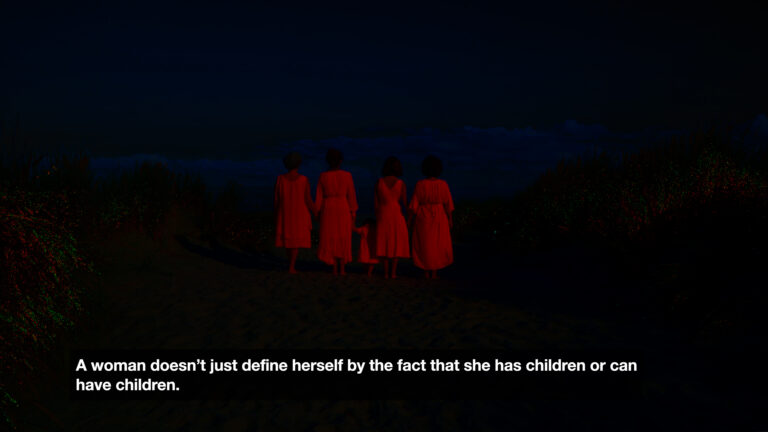
Anna Gohmert: Wechseljahre
Video Farbe, 26:04, HD, 2021
Sprecher:innensprache: Deutsch
Untertitel: Englisch
Audiodeskription: Deutsch
Der Film konzentriert sich auf den Umgang mit hormonellen Zyklen, die die verschiedenen Lebensphasen von Frauen markieren: So mag es genauso herausfordernd sein, dem Stimmungs- und Hormonwechsel seiner Menstruation zu unterliegen, als auch den hormonellen Veränderungen einer Schwangerschaft, der Menopause, oder der Zeit danach – wenn plötzlich diese vertraut gewordenen hormonellen Rhythmen wegbleiben. Die Künstlerin ihrer filmischen Erzählung der Frage nach: “Bin ich als Frau noch begehrenswert, obwohl ich, nach den scheinbar animalischen Gesetzmäßigkeiten der Natur, nicht mehr nach Fortpflanzung rieche?” Begleitet wird die filmische Suche nach Antworten von einer Taube, der die Künstlerin immer wieder die Eier wegnimmt, um ihre Fortpflanzung zu verhindern. In dem Film tauchen Stimmen einer Frauenärztin, der Mutter der Künstlerin, einer Schamanin und einer jungen Mutter auf – die früher in einem Taubenschlag gearbeitet hat, um die Geburtenkontrolle zu organisieren. Die experimentelle Bilderwelt besteht aus Tauben, dokumentarischem Material und Archivmaterial und konstruiert daraus Gegenerzählungen über “Weiblichkeiten”, Älterwerden, Selbstbestimmung, und Tier-Mensch-Verhältnisse.

Renate Liebel: Mutterkraut 1- 4
Installation mit Fotografien auf Alu Dibon gedruckt, verschiedene Größen (60 x 40 cm, 110 x 70 cm, 120 x 80 cm, 150 x 120 cm)
“Mutterkraut“ ist eine Serie von Objekten, die die Pflanze Tanacetum parthenium als Grundlage einer ästhetisch-überlegenden Forschung nimmt. Schon seit Jahrhunderten als Fiebersenker, Migränebekämpfer und Abortivum benutzt, gibt es also eine Pflanze, die nach Müttern benannt ist – ein Kraut mit vielen fürsorglichen Eigenschaften; solche, die oft mit den Ansprüchen an Mütter verbunden werden. „Mutterkraut” ist eine Auseinandersetzung mit Funktionen und Bedeutungen von Materialien und pflanzlichen Prozessen; eine Auseinandersetzung mit Erwartungen. Es erweitert das Spektrum der Möglichkeiten, wie “Mutter” gelesen werden kann und vereint dabei Kontraste, führt Unerwartetes zusammen und stellt gesellschaftliche Vorstellungen und Normen infrage.
Foto: Thommy West
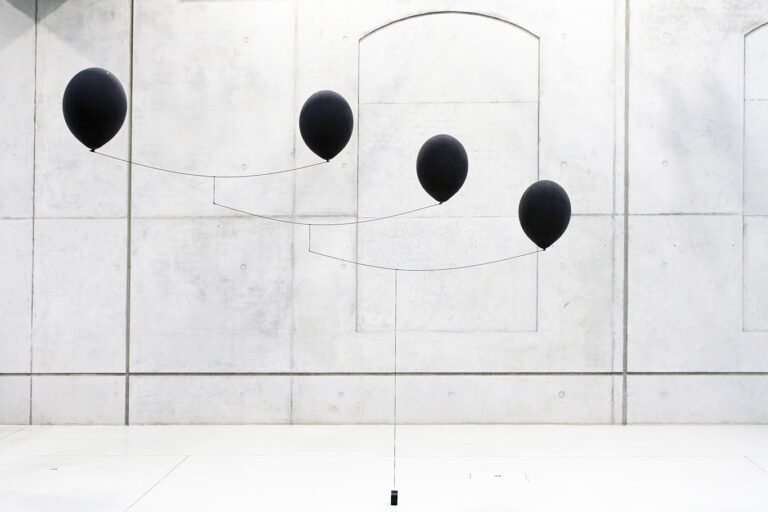
Marie Lienhard: EQUILIBRIO
2-Kanal-Video Installation (Loop), 2023
EQUILIBRIO ist eine Zweikanal-Videoinstallation, die zwei Arbeiten der Künstlerin in einen Dialog bringt und so neue Bedeutungsebenen entstehen lässt:
„shared Wings“ (2021) präsentiert den Betrachter*innen leichte, miteinander verbundene Sphären in Form von vier schwarzen, mit Helium gefüllten Ballons, die dünne, präzise austarierte Stäbe in die Höhe heben, um waagerecht zu schweben. Das Werk erinnert an die leichten Mobile von Alexander Calder, ist aber in dieser Anordnung auf den Kopf gestellt und damit von der Schwerkraft befreit. Ein Balanceakt gegen die Schwerkraft, der zu einem schwebenden Gleichgewicht wird.
Bei der zweiten Arbeit, LIMBO (2017), können die Betrachter*innen zwei 1.5 kg schwere Magnete beobachten, die in einer gewissen Entfernung schweben. Diese werden durch Kohlenstoff-Fasern auf Abstand gehalten, durch die sie in den Wänden verankert sind: Die beiden Metallblöcke bleiben so in einem waagerecht gespannten Gleichgewicht schwebend. Im Wesentlichen offenbart die Bewegung die Schwingung zwischen den beiden Magneten arrhythmisch, bis sie sich in exakter Symmetrie wieder annähern. Hier wird das Gesetz der Schwerkraft durch das Gesetz der Anziehung überwunden.
Beide Werke sind kraftvoll und doch filigran: Schon die kleinste Bewegung setzt die jeweiligen Systeme in Bewegung und spiegelt dabei das darauf fallende Licht. Im Dialog – vor allem im Rahmen von Mutterschaft(en) – werfen sie Fragen nach Fragilität, Co-Abhängigkeit, Verletzlichkeit, Machtspielen, Unterstützungsstrukturen, Abwesenheiten und Präsenz auf.
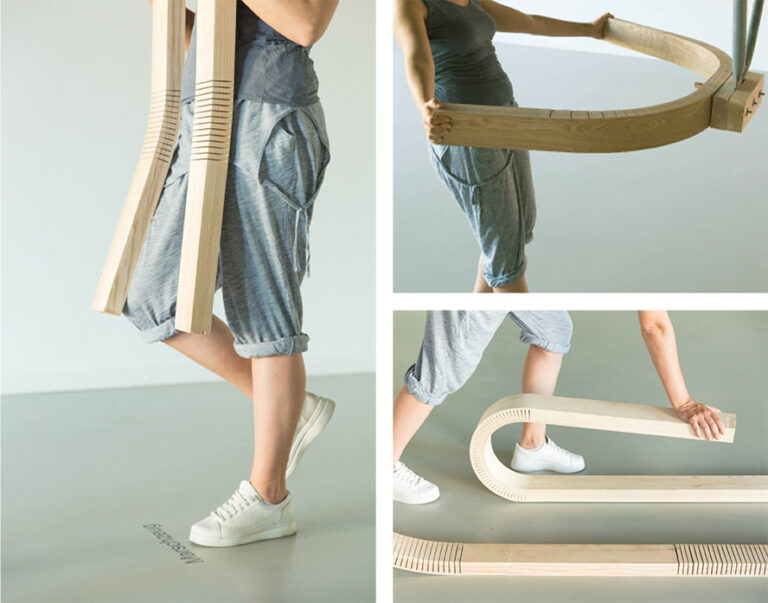
Anna Schiefer: Tokamak
Weihnachtsbaumspitzen, Holz und Gummi, 200cm x 200cm x variabel, 2023
Tokamak ist eine Installation in Form eines Laufstalls, die für sehr junge Menschen konzipiert wurde. Indem sich die künstlerische Arbeit von Anna Schiefer explizit an diese Besucher*innen richtet, unterläuft sie die gängigen Normen eines musealen Raums – der gemeinhin von “bitte nicht berühren!” und von Kunst, die nur Erwachsene adressiert, geprägt ist. Der Name der Installation „Tokamak“ bezeichnet zunächst eine Form; nämlich die eines Kernfusionsreaktors. Die spiralförmigen Bahnen der Teilchen im Reaktor bilden den Ausgangspunkt der räumlichen Analyse. Die Installation macht eben diese toroidale Form des Reaktors, wortwörtlich, greifbar und bildet dadurch ein haptisch-visuelles Erfahrungsfeld für Besucher*innen in den ersten Lebensmonaten. Der Boden ist dabei die Ebene mit welcher der Säugling den größten Kontakt hat und welche eine höhere Wahrnehmungsdichte aufweist. „Tokamak“ ist ein Versuch, dieses Feld als Spielfeld von Objekten, Akteur*innen und Objektakteur*innen auszumachen und auszuprobieren.
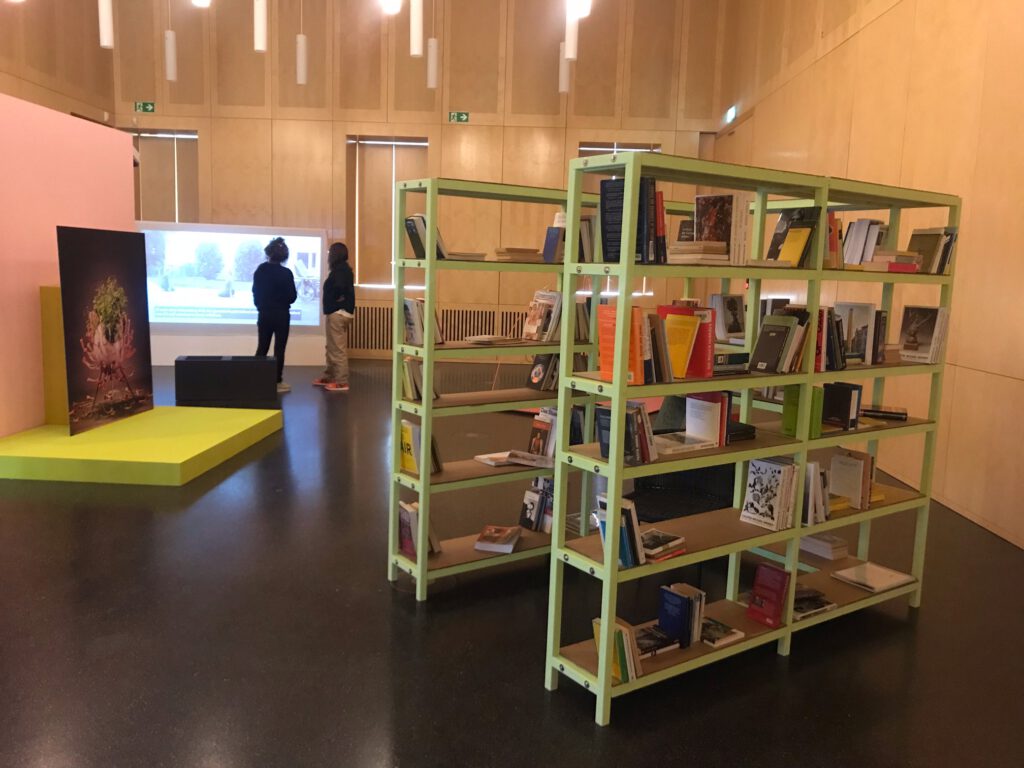
Für den Fall, dass man mal
Installation aus Regal und Büchern, 3 x 3 m, 2023
Für den Fall, dass es den Sommer regnen wird, hat sich die Künstlerin bereits in ihrer Kindheit einen kleinen Büchervorrat angelegt. Schon damals war sie auf einen dieser fiktiven Fälle vorbereitet, der dann nie eingetroffen war. Durch das Lesen eines Buches kann sich eine neue Welt eröffnen oder anders gesagt, lässt sich die Welt danach mit anderen Augen sehen. In ihrem Bücherregal “Für den Fall, dass man mal…”, zeige die Künstlerin jedoch die Bücher, die sie noch nicht gelesen hat, aber von denen sie denkt, dass sie sie in Zukunft lesen werde oder lesen sollte. Das Bücherregal stellt daher eine symbolische Repräsentation der verschiedenen Lebensentwürfe dar, die im Konjunktiv verweilen: Lebensentwürfe, die hätten sein können oder sollen. Gleichzeitig verhandelt das Bücherregal ungelesener Bücher, die unrealisierten Träume und Wünsche der Künstlerin, aber auch gesellschaftliche Zwänge und Erwartungen, denen sie in ihren verschiedenen Rollen als Künstlerin, als Frau, als junger Mutter glaubt, entsprechen zu müssen. Die ungelesenen Bücher eröffnen daher ein Spannungsfeld zwischen den eigenen und den gesellschaftlichen, die hier, bis auf Weiteres, als widerständige Leerstelle markiert werden.
Beitragende
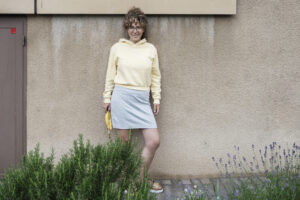
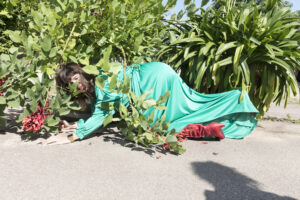
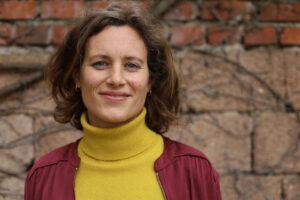
Anna Gohmert
setzt sich seit einigen Jahren mit generationenübergreifender Kommunikation, dem Miteinander, Frausein und Elternschaft auseinander. Gohmert sucht in ihrer künstlerischen Praxis unterschiedlichste Menschen auf, um z.B. den Themen Verlust, Orientierungslosigkeit und Einsamkeit nachzugehen. Sie fragt und hört den Erfahrungen und Perspektiven anderer Menschen zu, welches sie als integralen Bestandteil ihrer Arbeit betrachtet. In ihrer Arbeit ist es Anna Gohmert daher wichtig,
eine Formsprache für Intimität zu finden, ohne dass das Persönliche theoretisiert wird und die Zärtlichkeit oder Rohheit des Privaten verloren geht. Dabei spielen Themen wie soziale Gerechtigkeit, gesundheitliche Herausforderungen, Generationskonflikte sowie der Umgang mit Selbstwirksamkeit und Ohnmacht eine zentrale Rolle. Die Medien, die die Künstlerin wählt, orientieren sich daher immer an den Themen, was die Künstlerin bisher dazu bewegt hat, sowohl Videoarbeiten, multimediale Raum/Soundinstallationen, aber auch selbstgenähte Quilts zu schaffen.
Anna Gohmert lebt und arbeitet in Stuttgart. Sie hat in der Staatlichen Akademie der Bildenden Künste in Stuttgart studiert. Zuletzt war sie 2022 Residentin der Cité internationale des Arts in Paris. Sie ist eine der Gründerinnen von „Mothers*, Warriors and Poets“, einer Plattform, die Ausstellungen und Veranstaltungen rund um das Thema Mutterschaft und Kunst produziert.
Renate Liebel
ist eine Bildende Künstlerin, die in Oberschwaben und Southern California geboren und aufgewachsen ist. Sie hat ein Studium der Malerei und des Intermedialen Gestaltens an der ABK Stuttgart und der Universidad Complutense de Madrid absolviert, um mit einem Trickfilmbüro durch Europa zu reisen und ein Atelier für Objekte und Rauminstallation in den Ateliers des KV Wagenhalle in Stuttgart zu gründen. Auf der Suche nach stark kontrastierenden Materialkombinationen aus Pflanzen, Readymades und plastifizierten Formen findet sie das Surreale. Der Frage nachgehend, wo Natur aufhört und Kunst/Gesellschaft beginnt oder andersherum, tauchen Realitätsüberlagerungen in ihren Objekten, Installationen, digitalen Collagen oder Videoloops auf. In ihrer Praxis als Kunstvermittlerin schafft sie Raum für Achtsamkeit und Fürsorge, die als soziale Plastik gelesen werden soll.
Sie lebt mit ihrer fünfköpfigen Familie in Stuttgart und ist eine der Gründerinnen von „Mothers*, Warriors and Poets“, einer Plattform, die Ausstellungen und Veranstaltungen rund um das Thema Mutterschaft und Kunst produziert.
Foto: Jean & Claude
Julia Wirsching
entwickelt in ihren Arbeiten Situationen, die den Besucher*innen einen Erfahrungsraum bieten, um eigene Grenzen auszuloten. Das sinnliche Erleben der Arbeit geht mit einer Erfahrung und deren Körperlichkeit einher. Die Themen ihrer Arbeiten sind meist eng mit ihrem Leben und der Gesellschaft, in der sie lebt, verbunden. Dabei betrachtet sie den Körper als politisches Objekt, in dem er Ausführender und Handelnder von gesellschaftlichen Regeln, Zwängen und Konventionen ist. Unter körperpolitischen Fragestellungen untersucht sie vor allem, sie umgebende Fremd- und Selbstbilder und dekonstruiert diese.
Die Arbeiten von Julia Wirsching bestehen aus multimedialen Situationen, die sich aus Performances, Videos, Installationen oder Zeichnungen zusammensetzen. Durch das Überschreiten der gewohnten Grenze zwischen Intimität und Öffentlichkeit findet eine Konfrontation statt, die neben einer sinnlichen Erfahrung auch Raum gibt, die eigene Erfahrung zu reflektieren.
Julia Wirsching lebt und arbeitet in Stuttgart. Sie hat Musik, Philosophie und Bildende Kunst in Stuttgart und Tel Aviv studiert.
Foto: Jeanette Lemmerz
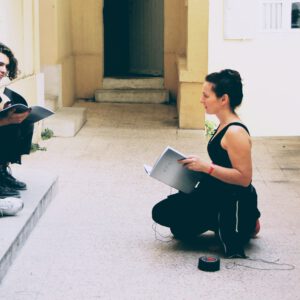
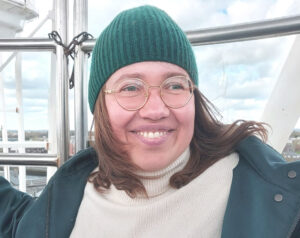
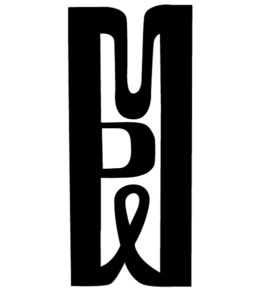
Marie Lienhard
ist eine in Stuttgart lebende und arbeitende Künstlerin. Die treibende Kraft hinter ihrer künstlerischen Praxis ist die Faszination für die Dehnbarkeit unseres Wahrnehmungsverhaltens. Sie untersucht und hinterfragt Realitäten an den Grenzen physikalischer Gesetze und fragiler Gleichgewichte. Installation, virtuelle Realität, Performance, Fotografie und Zeichnung sind die Medien ihrer künstlerischen Produktion, die international in Ausstellungen und öffentlichen Kunstsammlungen vertreten ist. Ihr Werk oszilliert zwischen körperlicher Erfahrung und den suggestiven Kräften, die durch bildnerische Mittel freigesetzt werden, sowie zwischen Naturphänomenen und gesellschaftlichen Fragen. Sie spricht unsere Wahrnehmungssinne an, um ästhetische Erfahrungen zu schaffen, die uns dazu einladen, uns unserer vermeintlichen Grenzen bewusst zu werden und sie herauszufordern. Der menschliche Wille, die physikalischen Gesetze, die Körper und Geist bestimmen, durch Allegorien des Fliegens, Schwebens oder Fallens zu überwinden, steht im Mittelpunkt ihrer Praxis.
Sie ist eine der Gründerinnen von „Mothers*, Warriors and Poets“, einer Plattform, die Ausstellungen und Veranstaltungen rund um das Thema Mutterschaft und Kunst produziert.
Anna Schiefer
ist Bildhauerin und lebt in Stuttgart und Berlin. Ihre praktische Forschung findet zwischen Architektur, darstellender und bildender Kunst statt. Sie untersucht Formensprachen von Gebrauchsobjekten und Energiebauten und verfolgt sie mit Stift, Text und Holz. Seit der Geburt ihres zweiten Kindes 2022 beschäftigt sie sich verstärkt mit dem frühkindlichen Wahrnehmungsapparat. Die Installation „Tokamak“ entstand in diesem Zusammenhang und ist Teil einer neuen Werkgruppe für unter Dreijährige.
Anna Schiefer ist darüber hinaus Gründungsmitglied des Verlags für Handbücher und derzeit künstlerische Mitarbeiterin an der Brandenburgischen Technischen Universität Cottbus-Senftenberg. 2020 erhielt sie ihren PHD in künstlerischer Forschung zum Thema „Reciprocal Props: Zur Wechselwirkung von Werk und Werkzeug“ von der École Européenne Supérieure de l‘Image Angoulême & Poitiers in Frankreich.
Zsuzsanna Ilijin
Gestaltung: Mothers Warriors and Poets
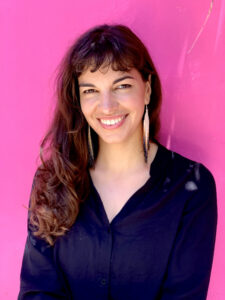
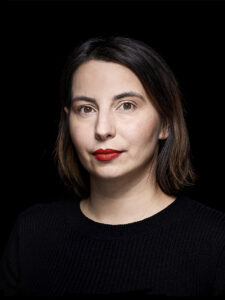
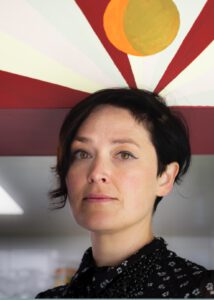
Sascia Bailer
ist eine feministische Wissenschaftlerin, Autorin und Kuratorin, die an der Schnittstelle von Care, Gender und zeitgenössischer Kunst arbeitet. Sie ist Doktorandin an der Zürcher Hochschule der Künste und der University of Reading. Sie hat international im Kunstbereich gearbeitet, unter anderem im MoMA PS1, im Haus der Kulturen der Welt und im Vera List Center for Art and Politics. 2019 – 2020 war sie die künstlerische Leiterin von M.1 der Arthur Boskamp-Stiftung. Sie ist die Autorin des Artikels „Care for Caregivers“ (in: „Curating with Care“, Routledge, 2023) und der Publikation „Curating, Care, and Corona“ (Arthur Boskamp-Stiftung, 2020). Sascia Bailer ist Mitherausgeberin der Anthologie „Letters to Joan“ (2020, HKW) und der Künstlerinnenbücher „Re-Assembling Motherhood(s): On Radical Care and Collective Art as Feminist Practices“ von Maternal Fantasies (Onomatopee, 2021), und „What We Could Have Become: On Queer Feminist Filmmaking“ von Malu Blume (Onomatopee, 2021). Sie erhielt ihren MA von der Parsons School of Design und ihren BA von der Zeppelin Universität.
Foto: Soledad Muriel
Didem Yazıcı
ist Kuratorin und Autorin und lebt zwischen Istanbul und Karlsruhe. Derzeit ist sie die Künstlerische Leiterin bei Yapı Kredi Culture and Arts in Istanbul und setzt somit ihre kuratorische Arbeit in Deutschland und international fort. Ihre kuratorische Arbeit ist inspiriert von interdisziplinärem Denken innerhalb und außerhalb der Kunst, der Auseinandersetzung mit sozialen und politischen Dynamiken und dem Potenzial von Ausstellungen als sozio-poetische Räume. Sie arbeitete und kuratierte Ausstellungen in Kunstinstitutionen wie dem Badischen Kunstverein, Karlsruhe (2017-18), der 11. Shanghai Biennale (2016), dem Museum für Neue Kunst, Freiburg (2015-16), dem Künstlerhaus Stuttgart (2014) und organisierte Vermittlungsprogramme für die dOCUMENTA (13), Kassel (2012-13) und die 2. Projektbiennale D-0 ARK Underground, Bosnien und Herzegowina (2013). Sie war Curator-in-residence am Goethe-Institut Kairo (2016) und nahm 2013 an Kuratoren-Workshops des ICI in New York und am A-Desk in Barcelona teil (2013). Sie absolvierte ihren Master in Curatorial and Critical Studies an der Städelschule und der Goethe-Universität Frankfurt und ihren Bachelor in Kunstgeschichte an der Mimar Sinan Universität Istanbul.
Foto: Sebastian Heck
Hettie Judah
ist leitende Kunstkritikerin und Autorin. Nach der Veröffentlichung ihrer 2020 erschienenen Studie über die Auswirkungen der Mutterschaft auf die Karriere von Künstlerinnen arbeitete sie 2021 mit einer Gruppe von Künstlerinnen an der Erstellung des Manifests „How Not To Exclude Artist Parents“, das inzwischen in 15 Sprachen vorliegt. Sie spricht regelmäßig über Kunst und mit Künstlerinnen bei Veranstaltungen in Museen und Galerien und war Gastdozentin an der Goldsmiths University und dem Royal College of Art in London sowie an der Dauphine University in Paris. Als Unterstützerin von Arts Emergency hat sie Künstler*innen und Studierende im Rahmen verschiedener Programme als Mentorin begleitet. Zu ihren jüngsten Büchern gehören How Not To Exclude Artist Mothers (and other parents) (Lund Humphries, 2022) und Lapidarium (John Murray, London, 2022/ Penguin, NY, 2023). Derzeit arbeitet sie u. a. an einem Buch und der Hayward-Wanderausstellung On Art and Motherhood (Eröffnung im Arnolfini in Bristol, März 2024).
Im Jahr 2022 gründete Hettie zusammen mit Jo Harrison die Art Working Parents Alliance – ein unterstützendes Netzwerk und eine Kampagnengruppe für Kuratoren, Akademiker, Galeristen, Techniker, Pädagogen und andere im Kunstbereich Tätige.
Foto: Alex Schneidemann
Exhibition (English Version)
Mothers*, Warriors, and Poets: Care as Resistance
With works by Anna Gohmert, Renate Liebel, Marie Lienhard, Anna Schiefer and Julia Wirsching
Curated by Sascia Bailer and Didem Yazıcı
Women* – especially mothers* – continue to perform the majority of unpaid care work, whether in the private or public sphere. In the art world, these inequalities related to caring responsibilities are magnified; the gender pay gap in the arts is higher than the overall societal average and discrimination based on caring work is widespread: „Sex, death, politics: art can show anything today. But children? They are not an issue. Especially for their mothers, they are considered career killers,“ says art critic Elke Buhr in the art magazine Monopol.
Our artistic-activist exhibition and event programming resists such stubborn, patriarchal narratives, as they seem to solidify how care is organised in our society – and thereby only continue to exclude people who provide care. By foregrounding feminist ethics of care – through artistic works and discursive formats – we aim to challenge these discriminatory narratives and explore counter-designs together:
The exhibition features five Stuttgart-based artists who are also mothers* with works that explore care, reproductive justice, societal role expectations, natural healing, vulnerability and interdependence. The exhibition opens with a public programming that seeks answers to the question: What structural changes in the art field are necessary to address the lived realities of cultural producers with caring responsibilities?
In lectures, performances and workshops, participants are invited to learn about the relationship between art and care and to collectively explore strategies and demands for addressing the needs of care workers in the arts.
„Mothers*, Warriors, and Poets: Caring as Resistance“ aims to connect artists who are parents in the region – and anyone who wants to advocate for these issues. Cultural practitioners with care responsibilities are to be empowered in their work and their working conditions; existing initiatives and energies of resistance are to be brought together to write a collective manifesto for a more just art sector in Stuttgart and the surrounding area.
„Mothers*, Warriors, and Poets“ is an artistic-activist platform founded by Stuttgart-based artists Anna Gohmert, Renate Liebel and Marie Lienhard to question and renegotiate the relationship between artistic production and motherhood*. The platform’s name is inspired by Black feminist Audre Lorde’s self-description, „black, lesbian, mother, warrior, poet.“
For Lorde, describing herself in several terms at once was central, as it revealed the complexity of her identity as well as her struggles as a Black feminist, artist, and mother* – to be a mother* artist is to be a warrior, and to think radically and evocatively like a poet at the same time. For this edition of „Mothers*, Warriors, and Poets“, the three initiators of the platform invited the artists Anna Schiefer and Julia Wirsching, as well as Didem Yazıcı and Sascia Bailer as curators – all of whom can be identified as independent cultural workers with care responsibilities in Baden-Württemberg.
*We use the term mother with an* to open it up to all people with caring responsibilities, who identify with the term.
Context of Exhibition
The entire StadtPalais – Museum für Stuttgart will be transformed into the „FemPalais – Festival of Women*“ for six months in spring 2023. In terms of content, all exhibitions, events and formats are exclusively dedicated to Stuttgarts women* and are directed, planned and implemented by women*. With a multi-perspective and intersectional approach, the festival makes visible women* who have shaped the history of the city of Stuttgart and beyond in the past and who are contributing to shaping the city of Stuttgart in the present and the future. A festival is being created that is intended to encourage and inspire as many girls* and women* as possible to visit with their sons*, brothers* and fathers*. More info here.“FemPalais” invited Mothers*, Warriors, and Poets as one of the exhibitions to address important feminist aspects and contributions within Stuttgart and beyond.
Public Programming of the Opening Day
Caring Culture:
Towards an art world in which artistic practice and care work go together
Sunday, May 21st, 2023
At StadtPalais – Museum für Stuttgart
Konrad-Adenauerstr. 2, 70173 Stuttgart
Programming Overview
10.30 am Doors open
11.00 am
Guided Exhibition Tour „Mothers*, Warriors, and Poets: Caring as Resistance“
With curators Sascia Bailer & Didem Yazıcı and the artists Anna Gohmert, Renate Liebel, Marie Lienhard, Anna Schiefer, Julia Wirsching
In German and English
At Salon Sophie, StadtPalais
12.00 am Talk by Hettie Judah „How to Not Exclude Mother Artists (and other Parents)“
Moderated by Sascia Bailer and Didem Yazıcı
Followed by an open discussion with audience
In German and English
Hybrid event (online talk, livestreamed to Saal Marie, StadtPalais)
To attend online please register here
13.30 pm Lunch Break
2.30 pm Workshop „Building Caring Infrastructures” with Sascia Bailer
Collective manifesto writing for a cultural sector that enables both caring and artistic work
In German
At Saal Marie (StadtPalais)
4.30 pm – 6pm
Open discussion & wrap up
Accessibility
- All rooms are wheelchair accessible
- Audio description for video work via GRETA app
- Audio introduction to the exhibition via QR code
- Exhibition text available in German, English and Turkish
- Breastfeeding room is available in the basement
During the opening day
- Free childcare
- Breastfeeding and playroom available
- English parts of the programme will be „whisper-translated“ into German
- Translation into German sign language
- The event is open to everyone, regardless whether they perform care work in their personal lives. We invite everyone to join towards structural changes within the arts.
If you should need further support, please reach out to contact@mothers-warriors-and-poets.net